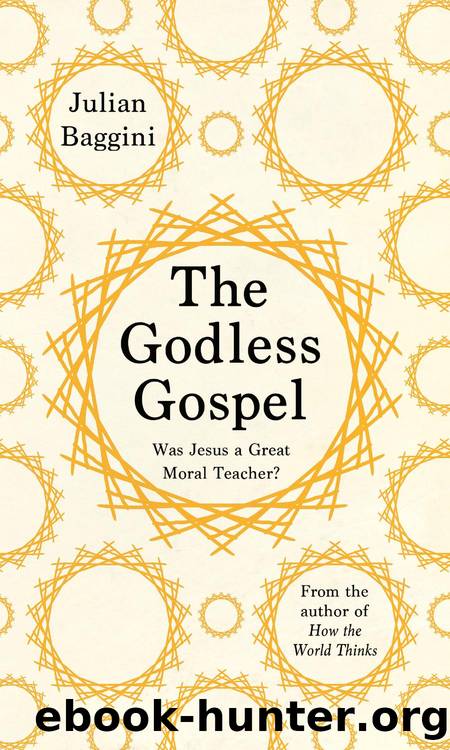The Godless Gospel: Was Jesus a Great Moral Teacher? by Julian Baggini

Author:Julian Baggini [Julian Baggini]
Language: eng
Format: epub
Publisher: Granta Books
Published: 2020-08-15T00:00:00+00:00
9
SOWING THE SEEDS OF DIVISION
The history of the Christian church is one of schism after schism. The first major break was when the Eastern Orthodox Church broke from the Catholic Church in Rome in 1054. Theologically, the key dispute was over the doctrine of the trinity: the divine triumvirate of God, Jesus and the Holy Spirit. Rome inserted the âFilioqueâ clause into the Nicene Creed, asserting that the Holy Spirt proceeded from the Father and the Son, whereas the Orthodox Church insisted it proceeded solely from the Father. The real causes of the break were probably more political than theological, but it would be foolish to deny dogma didnât matter at all. The second major split came in 1517, when Martin Luther gave birth to a nascent Protestantism by publishing his Ninety-five Theses, challenging the authority of Rome.
Christians often lament these and other countless divisions, but anyone who reads the Gospels with a modicum of attention would realise that Jesus foresaw anything but unity. Jesusâs promise to divide families is part of a wider rhetoric in which division rather than unity is legion. Without even attending to his words, it is clear that by his example he presents a divisive figure, one who creates dispute and conflict. The pattern is set when he begins his mission in Galilee, Nazareth and Capernaum (1:10â22). One minute people are âastonishedâ, asking, âWhence hath this man this wisdom?â The next they are âfilled with wrathâ and âthrust him out of the cityâ, ready to throw him off a cliff edge.
Jesus repeatedly tells his followers that they too can expect to divide people. âHe that heareth you heareth me; and he that despiseth you despiseth meâ (10:56). What is most striking is that he tells people not only to expect this but to accept it. The peacemakers may be blessed but on no occasion is his warning about the divisions ahead followed by an encouragement to heal them. His notorious line âI came not to send peace, but a swordâ (10:51) is a hyperbolic and proud statement that division is part of his mission, not a side effect of it.
Another unequivocal statement of division is Jesusâs claim âHe that is not with me is against meâ (10:44). At first sight this seems not only illogical but designed to stoke unnecessary conflict. It uses the same logic as President George W Bush did after 9/11 when he announced, âEvery nation, in every region, now has a decision to make. Either you are with us, or you are with the terrorists.â At the time Bush was widely criticised for making enemies of anyone who maintained neutrality. To see Jesus the âprince of peaceâ using the same tactic is somewhat shocking.
To try to understand what he meant, we need to attend to both the meaning of the phrase and its context. Sometimes such statements are merely descriptive: as a matter of fact everyone not for us happens to be against us. This would not seem to be the case for Jesus (or Bush).
Download
This site does not store any files on its server. We only index and link to content provided by other sites. Please contact the content providers to delete copyright contents if any and email us, we'll remove relevant links or contents immediately.
The Lost Art of Listening by Michael P. Nichols(7494)
Why I Am Not A Calvinist by Dr. Peter S. Ruckman(4149)
The Rosicrucians by Christopher McIntosh(3513)
Wicca: a guide for the solitary practitioner by Scott Cunningham(3167)
Signature in the Cell: DNA and the Evidence for Intelligent Design by Stephen C. Meyer(3132)
Real Sex by Lauren F. Winner(3014)
The Holy Spirit by Billy Graham(2944)
To Light a Sacred Flame by Silver RavenWolf(2814)
The End of Faith by Sam Harris(2733)
The Gnostic Gospels by Pagels Elaine(2527)
Waking Up by Sam Harris(2454)
Nine Parts of Desire by Geraldine Brooks(2361)
Jesus by Paul Johnson(2352)
Devil, The by Almond Philip C(2325)
The God delusion by Richard Dawkins(2305)
Heavens on Earth by Michael Shermer(2278)
Kundalini by Gopi Krishna(2180)
Chosen by God by R. C. Sproul(2161)
The Nature of Consciousness by Rupert Spira(2104)
